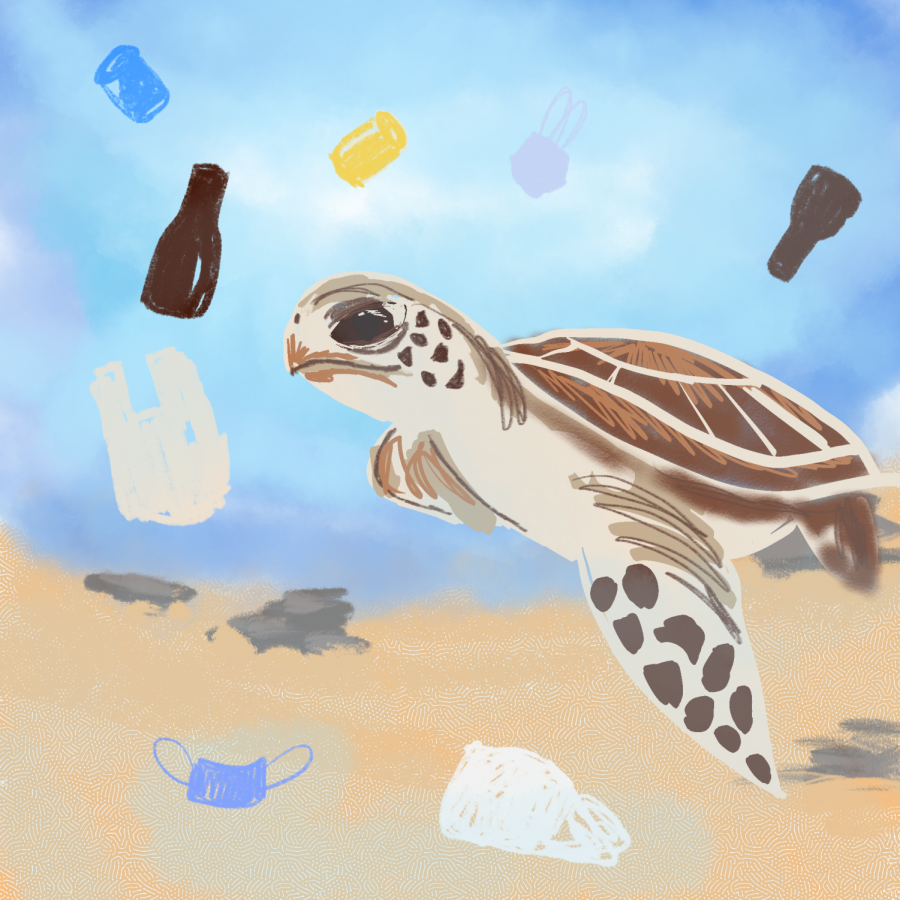Opinion | Reduce waste with small lifestyle changes
Apr 1, 2022
Sea turtles have been around for millions of years, peacefully roaming the ocean in search of their next meal. Leatherback sea turtles regularly prey on jellyfish. The problem: plastic bags highly resemble jellyfish to leatherbacks. Since the pandemic, face masks have also caught the eye of these hungry turtles.
As endangered animals, sea turtles are constantly threatened by the polluted waters they live in. I was able to visit a sea turtle rehabilitation center where they try their best to care for injured and disabled turtles. While these centers are helpful, they’re not preventative. The only foolproof way to stop sea turtles from consuming plastic is to keep it out of the oceans.
Pollution doesn’t just threaten sea turtles, but also everyone on earth. Climate change fueled by pollution jeopardizes all life on our planet. Doing something as small as recycling can save lives; you can help by changing a few daily habits.
The first step toward achieving zero waste on campus is locating your waste bins. If you don’t have access to both a garbage and recycling bin, you can request them. Most buildings on campus also offer places to dispose of your trash.
In 2018, the recycling rate in Champaign was just 13%. I’d like to help change this concerningly low number.
Get The Daily Illini in your inbox!
Knowing what to recycle is important and can help with waste management. Different places may recycle different types of materials. The University provides a list of what to recycle and where to recycle it.
Since the start of the pandemic the accumulation of masks in landfills — and sadly in the streets of Champaign-Urbana — has skyrocketed. There are several locations on campus to recycle your single-use masks, and I’m sure the sea turtles would greatly appreciate it if more students took advantage of these resources.
Other common items you may not know are recyclable include clothing, batteries, plastic grocery bags and more. This website has a whole list of things that can be recycled along with the locations in Champaign-Urbana where they can be dropped off.
Making lifestyle changes can also reduce the amount of waste you produce.
Doing small things, such as investing in a reusable water bottle, can save you the money you would’ve spent on plastic water bottles and help reduce the amount of trash that ends up in landfills or littered in the streets of Champaign-Urbana.
Other investments that help reduce waste are reusable grocery bags, second-hand clothing and silicone bags, which are often used to store perishable foods. These can all be found at stores in and around Champaign-Urbana.
While cutting down on your personal waste is helpful, corporations and cities also need to contribute their fair share. The campus municipal solid waste — waste that goes to landfills — diversion rate for 2020 was 16% short of its target.
Encouraging others to recycle and holding cities accountable for their waste management is vital in preserving our earth. The threat of climate change increases each day we don’t take action against it.
Look at the big picture. Losing sea turtles — a currently endangered species — will disrupt the balance of the marine ecosystem, which is already threatened by overfishing. There’s a symbiotic relationship between humans and marine life. If that relationship continues to be abused, both parties will suffer from the consequences.
Without taking preventive action, it won’t be long before species that humans depend on for life will become extinct.
Invest in recycling today, and it might just save the human race.
Maggie is a freshman in LAS.






